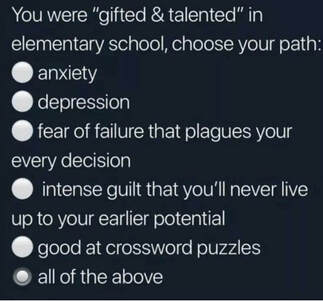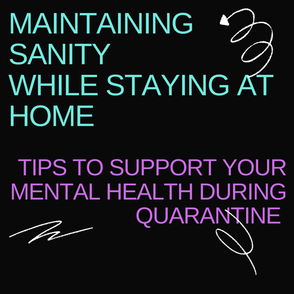|
Somedays I love the internet. It makes me laugh my butt off, helps me realize that all millenials are having knee pain now and it’s not just me, and the endless amount of dog videos literally makes my heart feel warm and fuzzy. I mean seriously, the “Cheese Tax” song just dropped and I cannot thank the creators enough for its ridiculousness. Yet some days I wake up and it immediately gives me massive amounts of anxiety. Every possible thing seems to offend someone. People are trolling and canceling each other left and right, without any point of reference or attempt at understanding. The news loves to inundate us with trauma- literal trauma- just to get a click. Today is one of those days for me. Yesterday I spent too much time online, but I felt all the positive feelings. I was recording in my own IG stories, connecting with strangers in my DMs, and I even made a new Reel (something that happens once every few months). After a long day at work, I even felt like recording a quick podcast episode. Who even am I? It felt good and productive and even fun. Not today. Today feels like everyone is angry at everyone and it’s giving me major High School vibes- the bullying, the cool kids running things and being worshiped, and me just wanting out. It literally feels so similar to HS. I know I’m not alone in this. I know it’s a phenomenon our entire generation is experiencing, while having no rule book or guidelines to follow. So the question is, what even is a healthy boundary with Social Media and how do you know where to set it? For me it looks like this: Paying attention to my anxiety and listening to its warning. I could do the work to trace back exactly where this anxiety is stemming from (because there’s always a source; an old wound) but that should probably be done with my therapist. Instead of seeing my anxiety as the problem, today I’m seeing the trigger as the issue. I know that, for me, reading other people’s arguments stirs up feelings of “conflict is bad- someone’s going to get hurt!” My logical self knows this isn’t necessarily true and that I’m in no danger, but my emotional brain (which is hardwired to protect me) just doesn’t feel comfortable with it today. The feeling of everyone being mad at each other is just too painful and unsettling. Until I can (or want to) process this fear on a deeper level, I can choose to just listen to my body. It’s screaming at me that Social Media doesn’t feel emotionally safe today. That could last a week, a day, a month, who knows. But I’m taking it one day at a time. So I’m logging off. It’s as simple as that. Take a break. You may not have to jump to an extreme of deleting your accounts, although that may be necessary. Do what’s best for you. It may require unfollowing particular accounts that stir up these issues. I’ve noticed that even some really great pages intentionally post controversial things just because the engagement it will get will help their algorithm. All attention is good attention, right? Even if the majority of the posts are great/helpful/decent, if they are occasionally asking for a fight, it’s probably not a good account for me to follow, given my sensitivities. I know this isn’t groundbreaking information or new advice, but it’s simply a reminder. You need time away from the perfection, keyboard warriors, trolls, and trauma images. Even if it’s not directed towards you, witnessing it can be exhausting to the system. It’s okay to admit that and take good care of yourself. Tomorrow I’ll try again and if it doesn’t feel good, I’ll continue to listen to my gut feeling. Logging off is a reminder of how small my circle really is, and today, that’s a really, really good feeling. AuthorJulie Hilton is a licensed therapist in Atlanta, who specializes in working with trauma, anxiety, and Self-Worth issues. If you are looking for a therapist and located in Georgia or Florida, reach out today for a free phone consultation! 678-329-9129
17 Comments
Let me just start off by being honest here. This is not going to be my best blog post. I can’t seem to focus like I do some weeks. I can’t seem to articulate myself well. I actually don’t even know what exactly I want to articulate here. I’m writing it anyway and posting it is going to make me cringe a bit. I hope that does not stop you from reading. And I’ll explain more in a moment.
The past few weeks I have been exploring how Self-Worth impacts so many areas of our lives. I have written on Self-Worth as it relates to anxiety, depression, relationships, setting and holding boundaries, and now today I want to talk a little on how Self-Worth relates to perfectionism. If you have been reading along, you’ve learned that different experiences in our lives teach us things about ourselves. What we learn becomes what we believe. It’s ingrained in us and goes to our very core. Remember those beliefs like:
Perfectionism is one way the deep core belief that you aren’t “good enough” shows up and says maybe, just maybe, if you do things absolutely perfectly, you can finally believe that you ARE. It is a way of telling ourselves that we are only “good enough” when we are performing well. (THANK YOU school systems for putting such an emphasis on a letter grade and starting this cycle before we are old enough to even spell the word ‘perfectionism’.) The delusion of being perfect becomes our measuring stick. How unreasonable. We set ourselves up to fail. We have been conditioned to believe that we are constantly proving our worth through our performance. As an adult, that can be our performance on a work project, our annual review, our weight/appearance, what is on our plate, our children’s grades/sports, how kept our house is, etc. All these things are easy for us to “grade” ourselves on. When we look like we have it perfectly together, we can give ourselves a gold star and believe that we are good enough. The anxiety this causes!! Omg! The constant assessment of how we are measuring up. The never ending string of negative thoughts if things are not perfect. It is absolutely exhausting and the reason for many breakdowns and panic attacks. And here’s another problem: people tend to think that perfectionists are high functioning people. That’s not usually true though. Perfectionism doesn’t give us the motivation or ability to do things perfectly- it only tells us that if we DON’T, bad things will happen (like, people will find out that we aren’t good enough). It’s actually paralyzing. One of the most common characteristics of a perfectionist is extreme procrastination (which often leads to just not doing the thing). I keep saying “we” because it’s me. I have dealt with this for years (and am still working through it). It has taken me a week to sit down and write this blog just because I want to avoid this topic. Ya girl has been procrastinatinggg. And yes, it’s been paralyzing. How many of you have looked at your to-do list of house work on Saturday morning and it seems so overwhelming that you can’t even get started? Half of the day goes by and you just continue to beat yourself up for not starting, but can’t seem to get going because the list is too long to do in one day. All or nothing, black or white thinking. It either all has to be done and your house has to look like something out of Southern Living, or there is no point in even trying. It’s impossible so you just don’t bother. Here’s where we have to do the work of separating our self-worth from the task at hand. The house (or the article) is not a representation of your worth. I am good enough when I write an average article. It doesn’t have to be mind blowing. It can still help people, which is my goal. The house doesn’t have to be spotless. It can have a few less spots from cleaning a few things, and the rest can be dealt with another day. Once we calm our spirit and recenter on what is really happening in front of us (putting this weight on our performance), it actually frees us to be able to do the thing (or at least part of the thing) that we have been so paralyzed from getting done. Hence me cringing ...but hitting “post” nonetheless. Once we recognize what impossible standards we are putting on ourselves, we can start to sort through what we actually want to believe and what we can choose let go of. If you are ready to start the journey of letting go of the unreasonable expectations you put on yourself- to be perfect and do everything perfectly- message me today and let’s start working on what life could look like without all these demands. No wonder by the time we are in our 30's and 40's we suddenly start to feel anxiety that we never experienced before! The snowball has grown!!! Last week I shared a blog about how Self-Worth (SW) is, to me, at the core of so much of who we are. It can have such a positive or negative impact on our lives, depending on how we see our worth and how that leads us to show up in every aspect of our lives. Over the next few weeks I’m going to share some thoughts on how the problem of not developing your SW shows up in so many different ways, for many different people.
Today we’re starting with ANXIETY because that is surely something most of us know at least a little bit about! (I also wrote about anxiety a few weeks back if you want to take a look at different symptoms and how it shows up for everyone differently). So, how could Self-Worth be impacting your anxiety levels? Here’s my theory: Anxiety is a snowball- not a single event. That means every time in life that you have been given the message that something, whether physically or emotionally, could be dangerous or potentially hurtful, your brain sends you a message to be aware, concerned, or ready to implement that fight-flight-freeze response if necessary. Anxiety is your brain’s alarm system that something could hurt you. When events that have caused the alarm to go off aren’t properly processed, your brain ties those feelings to the memory forever because it doesn’t know what else to do with them. It just stockpiles the emotion. It starts a snowball. Properly processing the events means that by the end of the day, you have accepted that you are safe, you aren’t at fault, and that your worth hasn’t changed based on the day’s events. I’m not just talking about severely traumatic events (although those definitely contribute here). I’m talking about tripping on stage in front of the entire elementary school, middle school mean girl run-ins, subtle messages from family that you are worthless, boyfriends cheating, failing tests. All of these experiences are emotionally unsafe. Our brains are wired to protect us. Unfortunately, sometimes we hold on to emotions that we need to let go of. As the emotions build from each of these events they cause “Negative Core Beliefs” to form about yourself such as: I’m not good enough (probably the most common I see in women) It’s unsafe to share emotions I’m a failure I’m bad I’m alone Once we establish a negative core belief, every time something happens (again, big or small) that sets off our alarm and FEELS similar, it gets added to the anxiety snowball. So in the moment when you are sitting in your boss’ office, getting a bad annual review and you can feel your breathing get shallow and your hands start to sweat- you aren’t just experiencing the stress from that moment. You are feeling the emotion from every unprocessed memory that has given you the feeling of your negative core belief (say in this case, “I’m being told I’m not good enough”). No wonder by the time we are in our 30’s and 40’s we suddenly start to feel anxiety that we never experienced before! The snowball has grown!!! How does SW fit into this equation? Because your self-worth has been grounded in a serious belief that you aren’t good enough (or any of the others I listed above and countless others). That is where you are operating from on a daily basis now because of all these messages you have been given. One of the things I work with clients on in therapy is revisiting some of those major events that have contributed to the negative core belief and we reprocess them from a different lens- one of reclaiming your SW in that moment. You can look back on those moments and rewrite what you tell yourself you are worth on that day. As we go through and define your SW for yourself (not by what others told you on that day), the snowball diminishes. The anxiety melts away. It’s absolutely possible to redefine your self-worth and undo what was planted, even at a young age. If this sounds like the work you are finally interested in doing, I challenge you today to make the call. Contact me so we can start the journey of increasing your self-worth so we can get rid of that anxiety, once and for all! -Julie The point of the quarantine is to be proactive in protecting other, more vulnerable populations. This is an act of love. It's Day One for me of our 2020 Quarantine and I'm already in need of a plan to protect my sanity. We live in a society that struggles with sitting still as it is (I'm totally guilty of this too) and the idea of needing to be at home for the foreseeable future is scary. So I'm putting together a list of things that I plan to do to protect my mental health and make the best of a tough situation. **Before I dive into my tips, can I please point out that I am not quaranteening myself out of FEAR. Quite the opposite. The point of the quarantine is to be proactive in protecting other, more vulnerable populations. This is an act of love. It would be selfish of me to try to keep on with business as usual. We have to protect elderly people at all cost.** 10 Tips to support your mental health during quarantine: 1- Keep a schedule.
I'm an Enneagram 3 so this is probably more important for me than for some others, but having a routine to structure my day is so important. If I sleep in, my whole day is off. If I don't know what I'm supposed to do, I feel lost. So I'm setting my alarm every morning, getting dressed and putting on makeup, eating meals at regular times, and I have an end time to my work day. Even if it's earlier than normal, there needs to be a time that you are "done" for the day just like any other day. 2- Make a To-Do list. This keeps me on track for the day and helps me prioritize my time. For those that are scrambling with more work than is feasible to do in a day or for those that have found themselves homeschooling (prayers up for you guys!)- make a list of what needs to be done for the day, do it, and then log off (physically and mentally). I know everyone's situation is different right now, but please protect your mental health by setting boundaries wherever you can. 3-Do things you have been putting off. For those of you that are not overwhelmed with work and you are trying to find ways to fill your time- tackle the things you have been procrastinating on. It's the perfect time! Imagine how good it will feel to have those things off of your plate when things do go back to "normal." So Spring Clean, do the home project, clear out your inbox, etc. You will be so glad you did. 4-Remind yourself that downtime is okay. Like I said, we live in a culture that values being busy. We'll sleep when we're dead. The grind never stops. And let me tell you- we are paying a high price for it. Maybe this is a good time to re-evaluate how we view downtime and embrace the NEED for mental health care. I encourage everyone to play around with some sort of daily quiet time such as journaling, meditation, or reading. If you find it difficult to sit in silence, I am going to venture to say you have some level of underlying anxiety and now is a good time to address it. If you want to learn what constant stress is doing to your body, I recommend the book Why Zebras Don't Get Ulcers by Robert M. Sapolsky. 5-Check on others. "Social distancing" doesn't mean social isolation. Use this time to check on those that you love. Reconnect with an old friend. Offer assistance to an elderly neighbor. We have so much technology that allows us to continue to get our social needs met but you have to be proactive! 6- Help others. We all have different challenges to work through here, but it's important to be aware that many people aren't just being "inconvenienced" right now. People are actually suffering. This is yet another example of how people living in poverty take the biggest hit and are so vulnerable. There are many creative ways to show love and support here! Find a local charity to donate to, use your power to ease the burdens of others (can you waive late fees? Delay evictions? Give your employees extra PTO?), offer to grocery shop for elderly neighbors so that they don't expose themselves to public places. Anything you can do will help. And side note- there's plenty of research that shows volunteering is good for YOUR mental health- so you are helping yourself out as you help others. 7-Find the good in the bad. I think this is so important. Focusing on the good doesn't mean living under a rock and minimizing the importance of what's going on. It is reminding yourself that EVERYTHING is not bad and it never is. Find some way to focus on what good things are happening. I personally am relying on memers for this right now and can't stop laughing when I scroll IG. And I need that. 8-Pace yourself. At this point we really don't know what the future holds. I'm hopeful and optimistic that we will not be quarantined for months (I am also PRAYERFUL for this- can we all agree that this needs to be happening daily?) Regardless of how long this last, let's all pace ourselves. If you knock out every project and to-do list in the first week, you are setting yourself up for a breakdown later on. If you let your mind run away with panic that this could last all summer, you could cause unnecessary anxiety. Let's all try to take it a day at a time. 9-Move and hydrate. Please move and hydrate. Do a home workout. Stretch. Drink water. Care for your body. 10- Remember, everyone is different. Please be kind to others. Everyone is having a different experience with this. People can't visit their loved ones in nursing homes. People are struggling to find daycare options. People are being furloughed and don't know how they are going to pay bills. People are working overtime to keep shelves stocked. People are in recovery and have limited access to support. We all need different things at this time but what nobody needs is to be judged, yelled at, or told they aren't handing this correctly. You are not an expert on other people and neither am I. This is MY list- I hope you take the time to make your own according to your circumstance, personality, and family situation. This is a chance we have to all be in this together and show love to our fellow human. And if there is any way that I can support you- please reach out. I'm happy to do what I can. With so much love, Julie (like, omg if I could just let it go DON’T YOU THINK I WOULD??) I recently posted a poll asking for suggestions on topics to explore together and the overwhelming response was anxiety. I’m honestly not surprised about this. Our society is dripping with anxiety, especially the past few weeks over the Coronavirus and how the average adult seems to not normally wash their hands very often. Whether you are feeling panicked about that or not, anxiety is a feeling that the majority of us can relate to.
I figured this would be a good intro topic for a mental health blog. First thing- like so many other words, we overuse the word “anxiety.” I need to make sure to point out to those of you that have never experienced true anxiety that it is not simply feeling nervousness or worry. Everyone has felt those things at some point, but not everyone has experienced anxiety. So please keep in mind that saying “It’s going to be okay” and “Just let it go” or my personal favorite “You just need to give it to God” are extremely unhelpful and invalidating (like, omg if I could just let it go DON’T YOU THINK I WOULD??) On the flip side, anxiety does not always look like a panic attack either. Many people deal with anxiety on almost a daily basis and have never experienced it as a full blown attack. That also should not invalidate what you are feeling and saying “Well it’s not that bad” to yourself is not helpful. There is no need to judge or compare our intensity- if it is distressing then you deserve help. Another point worth noting is that people struggling with anxiety often cannot tell you what it is tied to. Why am I feeling anxious? I have no idea and not knowing only exasperates the feeling. It also makes it feel harder to “fix” (without a therapist) because you are not sure of the source- however there are some universal coping skills that can help regardless of the origin that I will share in a bit. Anxiety also presents very differently for everyone. Here are some common symptoms of anxiety: Racing thoughts Sweaty palms Heart racing Negative self talk Panic attacks Shortness of breath Insomnia/Hypersomnia Irritability (this is often how mine presents and it took me a very long time to recognize that) Loss of or increase in appetite Feeling overwhelmed This is not a complete list by any means and I encourage you to make your own so that you can identify your own list of symptoms. You will hear me say this over and over, but I believe that awareness of a problem is half of the work. If you can work to increase your awareness (what, when, why, and how you are experiencing something) consistently, you will be able to work through it more effectively. Let’s start with some journaling prompts: What am I feeling right now? (see list of symptoms above or add your own) How intense am I feeling this from 1-10? Where do I feel it in my body? (Headache, tension, heart racing, tingling) How long did this feeling last? After you spend a few days asking yourself these questions and logging your answers, most people start to notice trends and patterns. Maybe it’s before work that you notice negative self talk increasing, at night you get antsy, or perhaps before seeing a particular family member you have a knot in your stomach. Once you notice a trend you can come up with a plan. 1- Get a therapist. (Why don’t you have one already? You have a PCP, right?) You should not have to deal with this alone. Even if your anxiety is not impairing your daily function, get a therapist. I use EMDR for anxiety and it works wonders. When you are searching for a therapist, specifically ask if they are EMDR trained because you will want this! More info on EMDR is coming in another blog post soon. 2- Build your toolbox of coping skills. 3- Make tough decisions. Do I need to set new boundaries (ooh wee...that's another hot topic) that will be hard in the beginning but help me in the long run? Do I need to change jobs? Do I need to change my DIET (Yes, girl. Diet has a HUGE impact on anxiety. More on that later.) So now that you have all of this awareness and you are waiting for your first appointment with your therapist, what to do in the meantime? Here is a short list of my favorite grounding techniques. For those of you interested in the science behind these, in short- anxiety activates your sympathetic nervous system. That’s the adrenaline rush, increase in heart rate, ready to run feeling you have. You want to calm that down and engage the parasympathetic system so that you can decrease those responses. That’s what these techniques do. Deep breathing- by far the easiest and most popular technique I would say. There are several simple breath counts that work but you have to find the one that is most effective for you. While you are counting breaths, try to only focus on what you are doing. Close your eyes and visualize your lungs expanding and contracting. 4 Square- think of drawing a square while you counting breaths. 4 counts in, hold at the top for 4, another 4 counts out, hold at the bottom for 4. When you are holding- don’t act like you are underwater, just gently sit with the inhale or exhale before moving to the next. 4, 7, 8- 4 counts in, 7 count hold, 8 counts out. The exhale engages the parasympathetic system, so the longer you spend exhaling vs inhaling, the more effective it will be. Belly breathing- regardless of which counting technique you use, you want to breath not just from the lungs but all the way through your abdomen. Sit with a straight back and place one hand on your chest and one on your belly. When you inhale, feel the breath come completely through your lungs and belly- you want to feel both expand. Then exhale to empty both. Acupressure points- if you are in a meeting and can’t close your eyes and belly breath (because that could be awkward, right?) you might want to learn about acupressure points. There are certain pressure points on your body that taking deeper breaths and massaging these spots can help to engage the parasympathetic system as well. The easiest pressure point is on your hand between your thumb and index finger. Gently massaging that soft point can be calming and the more you practice it, the more effective it will be. I have plenty of other coping skills that I plan to share, but starting with these is a great way to begin a mindfulness practice of managing your anxiety. At the end of the day, knowing you are not in this alone is so important. You aren’t. And you deserve help. Finding a community (like this one) that supports working through these issues with no shame and judgement is vital. I would love to connect and hear your experiences too! What helps you during anxious moments? |
Julie
|
Proudly powered by Weebly






 RSS Feed
RSS Feed